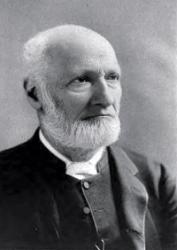Planning worship?
Check out our sister site, ZeteoSearch.org,
for 20+ additional resources related to your search.
- |
User Links
Person Results
Hans G. Nägeli

1773 - 1836 Person Name: Hans George Naegeli Composer of "NAOMI" in Sacred Hymns and Tunes Johann G. Nageli (b. Wetzikon, near Zurich, Switzerland, 1773; d. Wetzikon, 1836) was an influential music educator who lectured throughout Germany and France. Influenced by Johann Pestalozzi, he published his theories of music education in Gangbildungslehre (1810), a book that made a strong impact on Lowell Mason. Nageli composed mainly" choral works, including settings of Goethe's poetry. He received his early instruction from his father, then in Zurich, where he concentrated on the music of. S. Bach. In Zurich, he also established a lending library and a publishing house, which published first editions of Beethoven’s piano sonatas and music by Bach, Handel, and Frescobaldi.
Bert Polman
Hans G. Nägeli
John R. Sweney

1837 - 1899 Person Name: J. R. S. Composer of "ROCKWELL" in The Ark of Praise John R. Sweney (1837-1899) was born in West Chester, Pennsylvania, and exhibited musical abilities at an early age. At nineteen he was studying with a German music teacher, leading a choir and glee club, and performing at children’s entertainments. By twenty-two he was teaching at a school in Dover, Delaware. Soon thereafter, he was put in charge of the band of the Third Delaware Regiment of the Union Army for the duration of the Civil War. After the war, he became Professor of Music at the Pennsylvania Military Academy, and director of Sweney’s Cornet Band. He eventually earned Bachelor and Doctor of Music degrees at the Academy.
Sweney began composing church music in 1871 and became well-known as a leader of large congregations. His appreciators stated “Sweney knows how to make a congregation sing” and “He had great power in arousing multitudes.” He also became director of music for a large Sunday school at the Bethany Presbyterian Church in Philadelphia of which John Wanamaker was superintendent (Wanamaker was the founder of the first major department store in Philadelphia). In addition to his prolific output of hymn melodies and other compositions, Sweney edited or co-edited about sixty song collections, many in collaboration with William J. Kirkpatrick. Sweney died on April 10, 1899, and his memorial was widely attended and included a eulogy by Wanamaker.
Joe Hickerson from "Joe's Jottings #9" used by permission
John R. Sweney
Wolfgang Christoph Dessler
1660 - 1722 Person Name: Wolfgang C. Dessler Author of "O Friend of souls! how blest the time" in Sacred Hymns and Tunes Dessler, Wolfgang Christoph, son of Nicolaus Dessler, jeweller, at Nürnberg, was born at Nürnberg, Feb. 11, 1660. His father wished him to become a goldsmith, but, as he was not physically suited for this, he was permitted to begin the study of theology at the University of Altdorf. His poverty and bodily weakness forced him to leave before completing his course, and, returning to Nurnberg, he supported himself there as a proof reader. Becoming acquainted with Erasmus Finx or Francisci, then residing in Nürnberg, he was employed by Finx as his amanuensis, and at his request translated many foreign religious works into German. In 1705 he was appointed Conrector of the School of the Holy Ghost at Nürnberg, where he laboured with zeal and acceptance till
1720, when, by a stroke of paralysis, he was forced to resign. Finally, after an illness which lasted about 35 weeks, he died at Nürnberg, March 11,1722. Of his hymns, in all over 100, the best appeared, many with melodies by himself, in his volume of meditations entitled:—
Gottgeheiligter Christen Nützlich Ergetzende Seelenlust unter den Blumen Gottliches Worts, oder andächtige Betrachtungen und Gedanken über unterschiedliche erläuterte Schriftspruche, &c. Nürnberg, 1692 [Berlin] (Koch, iii. 531-535, and iv. 566-567).
From this work (the references to which have been kindly supplied by Dr. Zahn of Altdorf, from his copy), five hymns have been translated into English, viz.:—
Hymns in English common use:—
i. Ich lass dich nicht, du musst mein Jesus bleiben. [Constancy to Christ.] Founded on Genesis xxxii. 36. First published 1692, as above, p. 553, along with Meditation xviii., which is entitled "The striving love." Wetzel (A. H., vol. i., pt. iv., p. 20) says it was sung, at her re¬quest, Sept. 5, 1726, at the deathbed of Christiana Eberhardina, a pious Queen of Poland. In the Berlin Geistliche Liedersegen
Wolfgang Christoph Dessler
Philip Schaff

1819 - 1893 Author of "O Friend of souls, how blest the time" in Christ in Song Schaff, Philip, D.D., LL.D., was born at Chur, Switzerland, Jan. 1, 1819. He studied at the Universities of Tübingen, Halle, and Berlin. In 1843 he was appointed a Professor in the German Reformed Theological Seminary at Mercersburg, Pennsylvania, U.S.A., and in 1870 Professor of Sacred Literature in the Union Seminary, New York. As translator, author, and editor, Dr. Schaff holds high rank, both in Great Britain and America. The various Histories and Encyclopedias which he has edited are standard works. His knowledge of hymnology is extensive, and embraces hymns in many languages and of all ages, his speciality being German hymnody. The hymnological works which he has edited alone, or jointly with others, are:—
(1) Deutsches Gesangbuch, 1860; (2) Christ in Song, a most valuable collection of original English and American hymns, and translated hymns, N.Y. 1869, London, 1870; (3) Hymns and Songs of Praise for Public and Social Worship, 1874, in which he was assisted by Boswell D. Hitchcock, and Zachary Eddy; (4) Library of Religious Poetry, 1881, of which A. Gilman was joint editor.
Dr. Schaff has not composed any original hymns. His translations from the Latin are meritorious. He died Oct. 20, 1893.
--John Julian, Dictionary of Hymnology (1907)
Philip Schaff


 My Starred Hymns
My Starred Hymns


